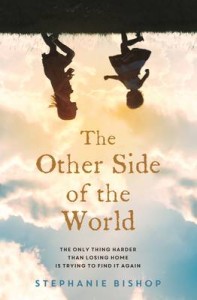 This was the first book I read for review after coming back from my hols. I was looking for something uncomplicated, nothing very taxing, and Stephanie Bishop’s novel with its gold-type adorned jacket looked like it might fit the bill but it took me by surprise. The Other Side of the World turns out to be a smart, elegantly understated piece of writing which looks at the complexities of parenthood and marriage, belonging and dislocation. The press release compares it to Rachel’ Cusk’s A Life’s Work but Bishop’s novel is altogether more subtle than that.
This was the first book I read for review after coming back from my hols. I was looking for something uncomplicated, nothing very taxing, and Stephanie Bishop’s novel with its gold-type adorned jacket looked like it might fit the bill but it took me by surprise. The Other Side of the World turns out to be a smart, elegantly understated piece of writing which looks at the complexities of parenthood and marriage, belonging and dislocation. The press release compares it to Rachel’ Cusk’s A Life’s Work but Bishop’s novel is altogether more subtle than that.
We know from the prologue that things have gone awry as Charlotte waits nervously in her small Cambridge bedsit, hearing the noises of her husband’s arrival but not the sounds of her children. From here, Bishop turns back the clock three years to 1963 when Charlotte, Henry and Lucie are crammed together in a tiny cottage in the dank, October English countryside. Charlotte has just learned she’s pregnant again but has yet to tell Henry. Lucie is only seven months old and Charlotte dreads the demands of another child. Once an artist, she has time for nothing but Lucie, struggling to keep on top of housework, cooking and childcare while Henry works as a lecturer. Charlotte takes solace in countryside walks, alive to the natural world whatever the weather, while Henry longs for the warmth of his Indian childhood, never quite accustomed to the English climate despite being sent to school in Britain to avoid the tumult of Independence. Henry is Anglo-Indian, fitting into neither country comfortably. When a leaflet arrives extolling the virtues of emigration to Australia, Henry sees an opportunity but Charlotte is reluctant: he may be rootless but she is not. Finally, she agrees to go if he can find a job. By 1965 they’re heading to Perth, now a family of four. Charlotte struggles with this alien, harsh landscape whose climate is either scorching or cold, while Henry finds that Australian academia is not quite as tolerant of his mixed race as he’d assumed. A crisis is clearly in the offing.
The theme of motherhood is not an easy one to tackle with honesty – the aforementioned Cusk came in for a great deal of stick when she did it – but Bishop succeeds in exploring its contradictions with a powerful subtlety. Charlotte has longed for a child but finds the reality hard. Henry is a good father, spending more time with his children than many men did in the 1960s, but it is Charlotte who bears the brunt of the hard slog of childcare. When regretting her agreement to go to Australia she remembers that ‘She was, quite literally, not herself then, but a woman dispersed among her children.’ The narrative shifts smoothly between Charlotte and Henry, equally subtle in exploring Henry’s growing awareness of his rootlessness and others’ perception of his racial identity. Bishop’s descriptions of both the English and Australian landscapes are vivid, often used to convey the ache of Charlotte’s longing for home. It’s a quietly perceptive novel – a meditation on parenthood, marriage and belonging all wrapped up in gorgeously understated prose. The final chapter is a triumph, neatly sidestepping clichéd sentimentalism. Bishop’s first novel seems to be unavailable in the UK . My hope is that Tinder Press, who have a sharp eye for this kind of fiction, will publish it in paperback.


I too have read this and it’s a stunningly well written story.
Why can’t I ‘like’ your posts on WordPress?
It’s such a beautifully written novel, isn’t it. Not what I was expecting from the jacket, somehow. I’d love to get my hands on her first novel.
Hmm… not at all sure about the ‘like’ problem but I think WordPress may have it in for us – your blog posts are not appearing in my reader for some reason despite my following you. I’ll investigate later.
Had my eye on this one for a while – such a great review reminds me why! Thanks Susan☺
And thanks to you, Poppy. I’m not sure how much attention it’s had – I think it may straddle that line between commercial and literary – but the writing is beautifully done. Well worth your time.
I have a number of friends whose adult children have faced the mixed race problem even though they work in academia. I think this might be a very good book to look at in the appropriate reading group. Thanks for the introduction.
You’re welcome, Alex. It’s a good choice for a reading group, lots to discuss.
Sounds a little close to home for me… and yet very tempting. I’ll add it to my TBR, although it may be hard to find.
Ah, maybe a difficult read for you, then. I hope you feel that you can – her writing’s beautiful.